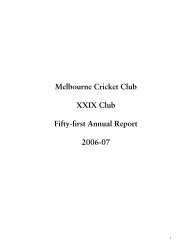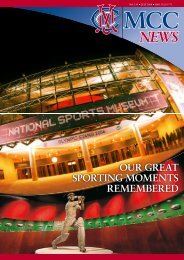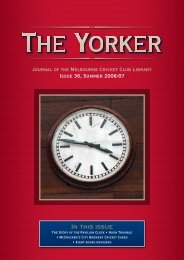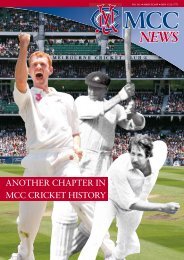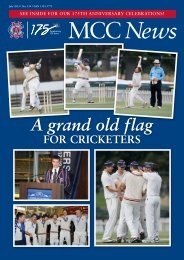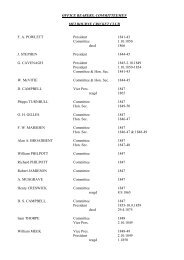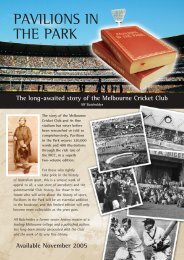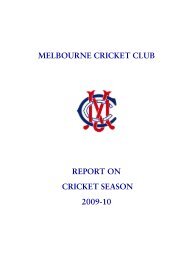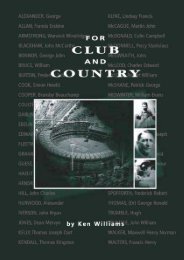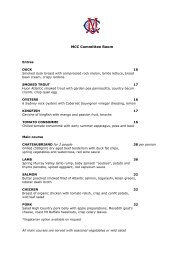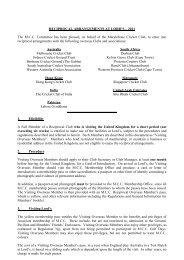Issue 42: Spring 2010 - Melbourne Cricket Club
Issue 42: Spring 2010 - Melbourne Cricket Club
Issue 42: Spring 2010 - Melbourne Cricket Club
You also want an ePaper? Increase the reach of your titles
YUMPU automatically turns print PDFs into web optimized ePapers that Google loves.
Pope and some other officers from the 1st Battalion's D Company<br />
rented an apartment at 11A Queens Road. Sixty years later, he<br />
would fondly remember great times shared with "about ten of us<br />
in a two-bedroom flat!" Among the neighbours who joined the<br />
merriment was wool broker Jock Anderson who "used to attend<br />
our gatherings in his kilts." Everyone in Queens Road "treated<br />
us kindly", even though "we were probably noisy!" In short, "the<br />
living was great!"<br />
For warriors, such soft times can never last. In September,<br />
Everett Pope left the MCG, destined for Cape Gloucester in New<br />
Britain. Many who were<br />
at the Cape believe that<br />
historians have neglected<br />
the First Division's efforts<br />
there. To the horrors<br />
familiar from Guadalcanal,<br />
this campaign brought<br />
another nightmare, as the<br />
Cape possesses one of the<br />
heaviest concentrations of<br />
rain that falls anywhere on<br />
earth.<br />
Division historian George<br />
McMillan wrote that when a<br />
fighting man finds that "the<br />
plant and animal life and<br />
the climate are as much<br />
or more of a menace to his<br />
existence than the armed<br />
human opposite him, [he]<br />
will feel he is the victim of<br />
an injustice." 5<br />
After leading his company in quagmires, unrelenting downpours<br />
and clothes that never dried out, Everett Pope undoubtedly felt<br />
that there was enormous injustice at Cape Gloucester. In one day<br />
of mopping-up operations, he led a 14-man patrol that killed 20<br />
Japanese and captured another seven during a 12-mile trek over<br />
jungle trails.<br />
In mid-1944, about 40 percent of the Division's veterans were<br />
sent home. Captain Pope was not among them. Instead, he was<br />
leading Company C of the 1st Regiment in the invasion of Peleliu,<br />
a coral island in the Philippine Sea. In his kit, he carried a picture<br />
of his wife, a prayer book and a volume of anti-war poems by<br />
Siegfried Sassoon that, fortunately, his superiors never saw.<br />
The operation was expected to last only four days. Instead, it<br />
dragged on for two months, for the Marines were facing 10,000<br />
entrenched Japanese whom Robert Leckie described as "ten<br />
thousand men as brave and determined and skillful as ever a<br />
garrison was since the art of warfare began." 6<br />
Peleliu brought the highest casualty rate of any battle in the<br />
Pacific war. In six days, Pope's regiment suffered 80 per cent<br />
casualties. Jim Wilson, in the 2nd Battalion, said that Peleliu<br />
made Guadalcanal seem like "a walk in the park." To make<br />
matters worse, the island's strategic value was dubious, a subject<br />
that angered Sergeant Charles Kelty for the rest of his life:<br />
Taking that island was a mistake. They could bypass it with no<br />
trouble without a cost of one life of a young Marine. This was<br />
the biggest mistake made in WWII …"<br />
Bob Barton blamed the debacle on "poor planning, poor<br />
leadership, a very poor job by the Navy in softening up the<br />
defences and a tenacious bunch of Japs who were very well dug<br />
in (many, many pillboxes) and well trained." While Pope readily<br />
Everett Parker Pope<br />
July 16, 1919–July 16, 2009<br />
acknowledged the pointlessness of the Peleliu campaign, he<br />
firmly believed that, as a Marine, he had to follow his orders,<br />
saying, "We had a job to do and we did it. And if we hadn't done<br />
that, we'd be capturing some other island, some other airfield."<br />
On September 19, with only 90 men at his disposal, Captain<br />
Pope was directed to take Hill 154, described as "an ugly chunk<br />
of charred, denuded, stump-covered coral, very steep, with<br />
little for a Marine to hide behind." Only 24 men reached the top,<br />
where they came under fire on three sides from Japanese on the<br />
higher ridges. Cut off from the rest of their battalion and heavily<br />
outnumbered, Pope and his<br />
men were determined to<br />
hold the hill.<br />
Throughout the night, they<br />
faced relentless attacks.<br />
Eventually, the Marines<br />
were so short of grenades<br />
that they hurled "three<br />
or four rocks, then a<br />
grenade." By dawn, they<br />
were using their bare fists<br />
and empty ammunition<br />
boxes to repel the<br />
Japanese. When Pope was<br />
ordered to withdraw, only<br />
eight American riflemen<br />
remained. During their<br />
month on Peleliu, the First<br />
Division suffered over 6500<br />
casualties, more than onethird<br />
of the entire division.<br />
So severe were these losses that the First remained out of action<br />
until the Okinawa invasion of April 1945. By then, most of the<br />
veterans from Guadalcanal and the MCG had returned to the<br />
United States. However, as they sailed from Peleliu, they did<br />
not fully comprehend their situation. As Bill Finnegan observed<br />
recently, "We were not aware of what had happened to us, only<br />
that there were not many of us left to talk about it ... We were<br />
simply grateful to get the hell off that rock in one piece..."<br />
For his "conspicuous gallantry and intrepidity at the risk of his life<br />
above and beyond the call of duty" during that night on Hill 154,<br />
Captain Pope was awarded America's highest military decoration,<br />
the Medal of Honor. The citation was signed by President<br />
Roosevelt on April 11, 1945, the day before he died. The medal,<br />
with its distinctive light blue ribbon, was presented by President<br />
Truman at the White House on June 15.<br />
During the ceremony, the Marine hero reputedly remarked that<br />
he would rather have the medal than be President of the United<br />
States. In his usual forthright way, Truman replied that he would<br />
prefer to have the medal. 7 Everett Pope did not view the medal as<br />
something that was his alone:<br />
I wear it proudly, not because of anything I did to deserve<br />
it. But out of respect for my men who died up there, and to<br />
prolong, at least for a moment of time, their place in our<br />
nation's history. As you know, it was twelve days before my<br />
dead on that hill were recovered. 8<br />
No one can truly appreciate the place held by that hill in Pope's<br />
soul. When he revisited what he termed "that terrible island" in<br />
1994, locals claim that, despite his 75 years, he ran to the top of<br />
the hill, where he collapsed and wept. 9 9<br />
The Yorker - <strong>Spring</strong> <strong>2010</strong> 13



